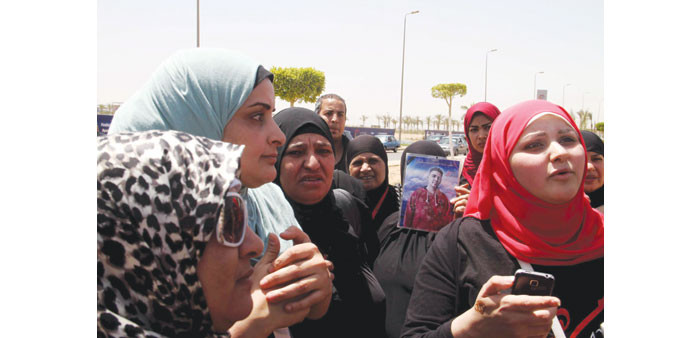AFP
Cairo
An Egyptian court yesterday sentenced 11 football fans to death after a retrial over a 2012 stadium riot in the canal city of Port Said that left 74 people dead.
An appeals court had ordered the retrial of 73 defendants in February last year after rejecting a lower court verdict sentencing 21 people to death for being involved in the incident.
The riot erupted in February 2012 when fans of home team Al Masry and Cairo’s Al Ahly clashed after a premier league match between the two clubs.
Yesterday’s death sentences against 11 football fans have been referred to Egypt’s grand mufti.
The court will make a final decision on their fates, as well as those of the other defendants, on May 30.
The 73 defendants include nine police officers and three officials from Al Masry club, while the rest were Al Masry fans.
Two of those sentenced to death are on the run.
None of the families of the victims or of the defendants attended yesterday’s court session, which was held in Cairo for security reasons.
The verdict can be appealed.
The 2012 clashes in the Port Said stadium sparked days of violent protests in Cairo, in which another 16 people were killed in fighting with security forces.
A year later, dozens of people also died in the canal city during clashes that erupted after the lower court handed down the 21 death sentences.
The Port Said riots were the deadliest sport-related riots in Egypt, where football fans regularly clash with rival supporters or security forces.
The authorities reacted by imposing a ban on fans attending premier league matches and held the games behind closed doors.
But on February 8, at least 19 people died in a stampede after police fired teargas at fans trying to force their way into a Cairo stadium for a premier league match that was open to the public.
Television footage showed crowds squeezed inside a narrow metal enclosure, jostling to enter the stadium when the stampede erupted as police fired teargas.
The police reject the accusations and blame the unrest on Islamists. Sixteen suspects accused of clashing with police on that day have been arrested and referred to trial.
Since the ouster of Islamist president Mohamed Mursi in July 2013, his supporters have been the target of a government crackdown overseen by his successor President Abdel Fattah al-Sisi.
Egypt’s hard-core football fans, the “ultras”, have often clashed with police, including in political unrest that has seen two presidents toppled since 2011.
The “ultras” were at the forefront of protests against long-time autocrat Hosni Mubarak, who stepped down in early 2011 after an 18-day uprising against his rule.
That uprising was essentially against the police, who were regularly accused of torturing detainees and of being involved in extra-judicial executions.
Brotherhood trial relied on single testimony: Human Rights Watch
The prosecution’s evidence in a trial this month of 51 alleged Muslim Brotherhood supporters in Egypt relied on the testimony of one police officer, Human Rights Watch said yesterday.
HRW said the prosecution had presented little evidence to show the defendants did anything other than spread news about a mass sit-in in Rabaa square in 2013 and organise peaceful protests.
The court on April 11 had condemned 14 men to death and 37 others to a life sentence for their actions in opposition to the ousting of Islamist president Mohamed Mursi in 2013 by the military under Abdel Fattah al-Sisi, who is now president.
HRW’s criticism of Egypt’s judiciary comes two days before a separate trial involving Mursi in which he could face a possible death sentence.
The charges in last week’s trial ranged from publishing false news to planning to spread chaos. Those sentenced to death included Mohamed Badie, leader of the Brotherhood.
The court also gave a life term to Mohamed Soltan, a US-Egyptian citizen, in a decision condemned by the White House. The sentences can be appealed.
“Prosecutors presented no evidence other than testimony from a police major in the National Security Sector of the Interior Ministry to support their accusation that the defendants planned to use violence to overthrow the government,” HRW said.
It cited a 107-page government file which it said it had verified with a lawyer on the defence team. HRW did not monitor the trial.
A foreign ministry spokesman rejected the HRW statement as “completely wrong again” and said Egypt had a fully independent judicial system with an appeals process that was open to all.
“Nobody can interfere in the work of the judiciary. The whole judicial process and the due process is guaranteed for all accused,” Badr Abdelatty said.

Family members of football fans who died during the stadium violence in 2012 react outside the court in Cairo yesterday.
